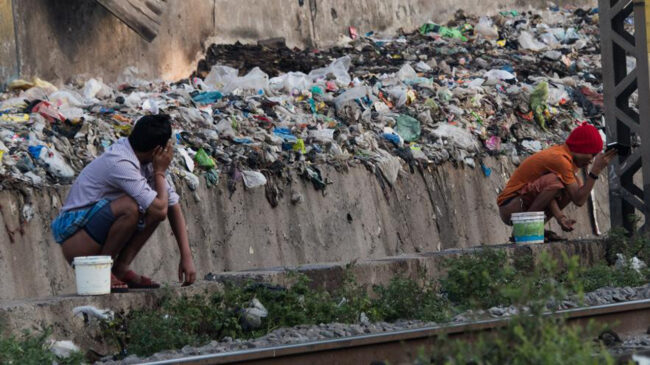By: Vera Macdonald
OPEN defecation, the act of relieving oneself in open spaces rather than in designated sanitation facilities, remains a pressing issue in many parts of Nigeria, including Ibadan, the capital of Oyo State. Open defecation is not just a sanitation issue, it’s a matter of public health, dignity, and urban aesthetics. In Ibadan, the prevalence of this practice in areas like Soka, along the Lagos-Ibadan Expressway and other parts of Ibadan, open defecation has become alarmingly common. Residents and pedestrians along the Lagos-Ibadan Expressway have expressed concerns over the continuous open defecation on the reconstructed drainage systems, Miscreants have defaced the road median with feces, causing pedestrians to cover their noses due to the unbearable stench.When attempting to walk beneath the Soka Bridge, one is met with the unpleasant sight of feces scattered across the ground, and the stench in the area is overwhelmingly foul. You have to carefully watch your steps while walking to avoid stepping on human waste, making the experience both uncomfortable and distressing.
How did we get to a point where walking through a public space in a major city feels like navigating a minefield of human waste? Are we normalizing an abnormal situation simply because it has existed for too long? When will we begin to treat toilets and sanitation not as luxuries, but as necessities tied to our health and dignity? The median from Berger in Lagos State inward Kara, Warewa, and Mowe in Obafemi Owode Local Government Area of Ogun State has become regular spots for defecation. This unsanitary practice not only poses health risks but also tarnishes the image of the city. In Ibadan, the Ogunpa River, which flows through the city’s core, is significantly polluted by solid waste, including human feces. This contamination poses serious health risks to residents who rely on the river for various purposes. Open defecation is a significant contributor to the spread of diseases such as cholera, typhoid, and diarrhea. According to UNICEF, more than 100,000 children under five die each year in Nigeria due to diarrhea, with 90% of these deaths directly attributable to unsafe water and sanitation.
Residents should be thoroughly educated on the severe health risks associated with open defecation-not just through posters or occasional talks, but through consistent, community-based awareness campaigns that break down the connection between poor sanitation and life-threatening diseases like cholera, typhoid, diarrhea, and hepatitis. Many people continue this practice not out of choice, but out of ignorance or lack of options. Education must be relatable, delivered in local languages, and use real-life examples of how open defecation has harmed families and communities. There must be strong and visible enforcement of sanitation policies. It’s not enough to simply urge people to stop defecating in public, there must be clear consequences for those who choose to ignore the rules. Why should laws meant to protect public health be treated casually? If someone throws trash on the street, there are fines, So why should defecating in public be a far more dangerous act to be tolerated? Open defecation spreads deadly diseases and affects the entire community, especially children. It pollutes the environment, contaminates water sources, and creates long-term public health crises.
ALSO READ: Ladoja to be crowned 44th Olubadan on Friday, September 26
The lack of adequate, accessible, and functional toilet facilities. No matter how much awareness is raised or how strictly policies are enforced, people will continue to defecate in the open if they have no alternatives. How can we expect people to make better choices when those choices don’t exist? Many areas in Ibadan-such as Soka, parts of Oke-Ado, and even busy commercial hubs along the Lagos-Ibadan Expressway-either lack public toilets entirely or have facilities that are broken, unsafe, or too unhygienic to use. A functional toilet is not a luxury, it is a basic human right. Infrastructure must come first. Enforcement should also apply to property developers, market leaders, and landlords. Public and private buildings without adequate toilet facilities should be held accountable. How can a motor park, market, or construction site operate without providing toilets for hundreds of people? This lack of responsibility fuels open defecation.
A clean city is a shared duty. Let’s choose hygiene, protect our health, and put an end to open defecation, one community at a time.It starts with awareness, grows with action, and succeeds when everyone plays their part.
•Macdonald is a 400 level student of Mass Communication at Lead City University.
WATCH TOP VIDEOS FROM NIGERIAN TRIBUNE TV
- Let’s Talk About SELF-AWARENESS
- Is Your Confidence Mistaken for Pride? Let’s talk about it
- Is Etiquette About Perfection…Or Just Not Being Rude?
- Top Psychologist Reveal 3 Signs You’re Struggling With Imposter Syndrome
- Do You Pick Up Work-Related Calls at Midnight or Never? Let’s Talk About Boundaries







